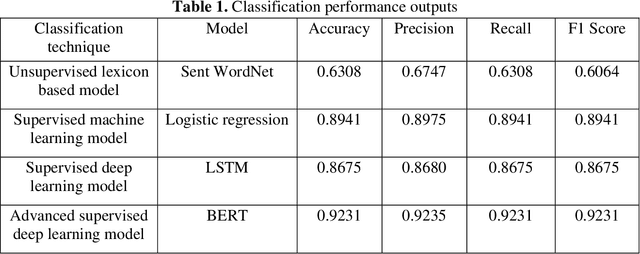Shivaji Alaparthi
Data Scientist, CenturyLink, Bengaluru, India
Bidirectional Encoder Representations from Transformers (BERT): A sentiment analysis odyssey
Jul 02, 2020
Abstract:The purpose of the study is to investigate the relative effectiveness of four different sentiment analysis techniques: (1) unsupervised lexicon-based model using Sent WordNet; (2) traditional supervised machine learning model using logistic regression; (3) supervised deep learning model using Long Short-Term Memory (LSTM); and, (4) advanced supervised deep learning models using Bidirectional Encoder Representations from Transformers (BERT). We use publicly available labeled corpora of 50,000 movie reviews originally posted on internet movie database (IMDB) for analysis using Sent WordNet lexicon, logistic regression, LSTM, and BERT. The first three models were run on CPU based system whereas BERT was run on GPU based system. The sentiment classification performance was evaluated based on accuracy, precision, recall, and F1 score. The study puts forth two key insights: (1) relative efficacy of four highly advanced and widely used sentiment analysis techniques; (2) undisputed superiority of pre-trained advanced supervised deep learning BERT model in sentiment analysis from text data. This study provides professionals in analytics industry and academicians working on text analysis key insight regarding comparative classification performance evaluation of key sentiment analysis techniques, including the recently developed BERT. This is the first research endeavor to compare the advanced pre-trained supervised deep learning model of BERT vis-\`a-vis other sentiment analysis models of LSTM, logistic regression, and Sent WordNet.
 Add to Chrome
Add to Chrome Add to Firefox
Add to Firefox Add to Edge
Add to Edge